Amid Iran and impeachment, Donald Trump’s focus is reelection
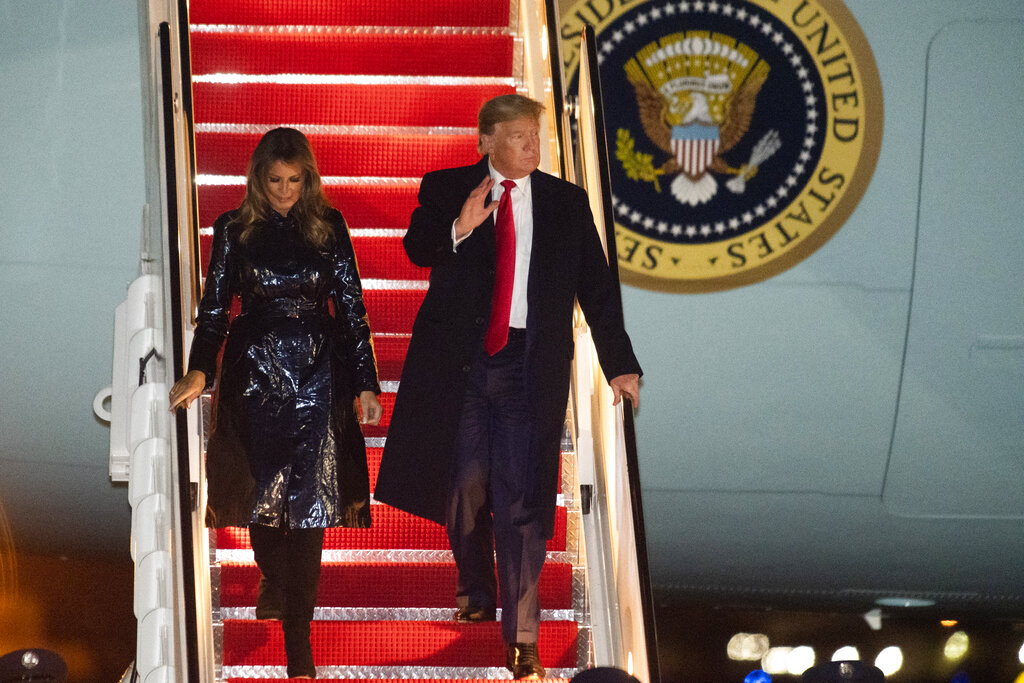
Donald Trump is being attacked on two sides.
House to Vote on Restraining Trump’s Actions Against Iran

Republicans say the proposal does not have the force of law.
Iran Strikes Back at US with Missile Attack at Bases in Iraq

Iranian state TV said it was in revenge for the killing of Revolutionary Guard General Qassem Soleimani.
US says ex-intel official defected to Iran, revealed secrets
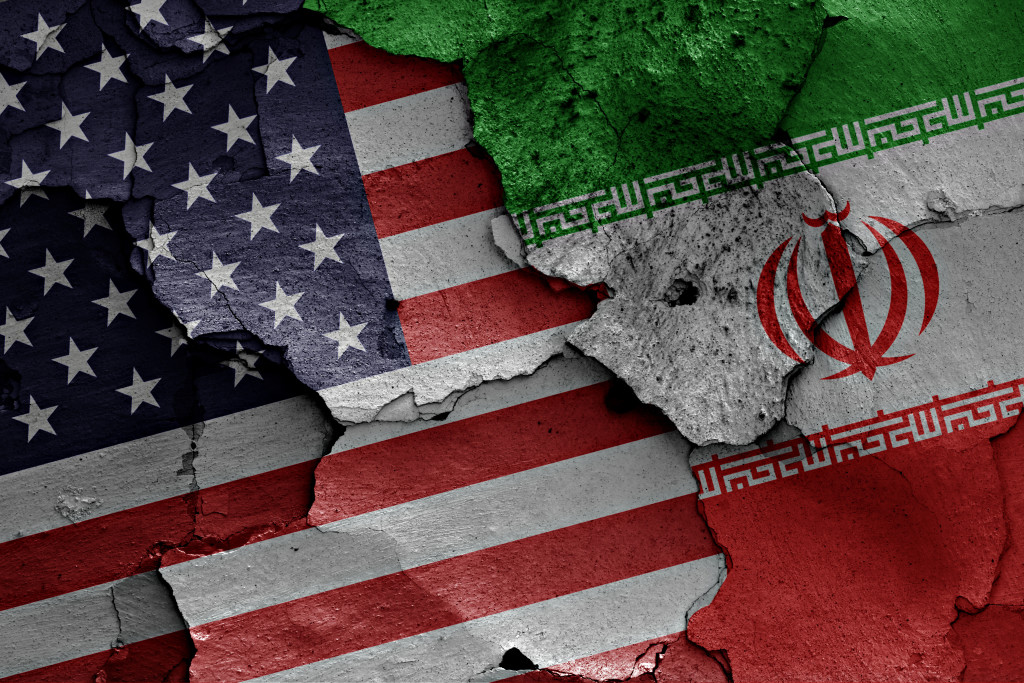
A former U.S. Air Force counterintelligence specialist who defected to Iran despite warnings from the FBI has been charged with revealing classified information to the Tehran government, including the code name and secret mission of a Pentagon program, prosecutors said Wednesday. The Justice Department also accused Monica Elfriede Witt, 39, of betraying former colleagues in the U.S. intelligence community by feeding details about their personal and professional lives to Iran. Four hackers linked to the Iranian government, charged in the same indictment, used that information to target the intelligence workers online, prosecutors said. Witt had been on the FBI’s radar at least a year before she defected after she attended an Iranian conference and appeared in anti-American videos. She was warned about her activities, but reassured agents that she would not provide sensitive information about her work if she returned to Iran. She was not arrested. “Once a holder of a top secret security clearance, Monica Witt actively sought opportunities to undermine the United States and support the government of Iran — a country which poses a serious threat to our national security,” said FBI executive assistant director Jay Tabb, the bureau’s top national security official. Tabb said “she provided information that could cause serious damage to national security,” though he did not provide specifics. Witt remains at large in Iran, as do the four hackers, who prosecutors say were acting on behalf of the government-linked Iranian Revolutionary Guard, prosecutors said. That group has been designated by the U.S. government as promoting terrorism. The hackers, using imposter Facebook personas, then targeted those same officials and were even able at one point to join a private Facebook group composed primarily of retired government workers, the indictment says. The hackers sent the targets messages and emails that purported to be legitimate but instead contained malicious software that, if opened, would have given them access to the officials’ computer and network. The Texas native served in the Air Force between 1997 and 2008, where she was trained in Farsi — the predominant language of Iran — and was deployed overseas on classified counterintelligence missions, including to the Middle East. She then found work as a Defense Department contractor. She defected to Iran in 2013 after being invited to two all-expense-paid conferences in the country that the Justice Department says promoted anti-Western propaganda and condemned American moral standards. She was a Defense Department contractor at the time. The Treasury Department on Wednesday sanctioned the New Horizon Organization, which sponsored the conferences Witt attended. American officials say the conferences, which promote Holocaust denial and conspiracy theories, serve as a platform for Iran to recruit and collect intelligence. Witt first traveled to a “Hollywoodism” conference in 2012, when she appeared in Iranian television videos in which she identified herself as a former U.S. service member with. She was warned that May by FBI agents that she was a potential target for recruitment by Iranian intelligence. “She chose not to heed our warning that travel to Iran could potentially make her susceptible to recruitment,” Tabb said. “She continued to travel.” She attended the same conference the following year and was hired by an unnamed individual to assist in the filming of an anti-American propaganda commercial. Given free housing and computer equipment, she went to work for the Iranians, turning over information about a classified Defense Department program and assembling into “target packages” research she conducted into the family lives, locations and missions of former colleagues. The indictment includes snippets of dialogue between Witt and the person who recruited her her, identified only as Individual 1. In 2012, for instance, the person wrote her, “should i thank the sec of defense…u were well trained. Witt replied with a smiley emoticon, “LOL thank the sec of defense? For me? Well, I loved the work, and I am endeavoring to put the training I received to good use instead of evil. ?? Thanks for giving me the opportunity,” according to the indictment. Using a typed smiley-face, she later told the same, unnamed person, “If all else fails, I just may go public with a program and do like Snowden.” That’s a reference to Edward Snowden, a former NSA contractor who leaked classified U.S. information. “Our intelligence professionals swear an oath to protect our country, and we trust them to uphold their oath. With good reason,” said Assistant Attorney General John Demers, the head of the Justice Department’s national security division. “But every great while, one of these trusted people fails us.” Officials would not elaborate on why the indictment was brought six years after her detection, except to say that they had to move classified intelligence into an unclassified format to be used in a pending criminal proceeding. The Justice Department officials would not say whether Witt’s prosecution was connected to an American-born Iranian television anchorwoman who was recently released after being detained by the FBI as a material witness in an undisclosed U.S. case. Marzieh Hashemi works for the Press TV network’s English-language service. She has not been charged with any crimes. Federal law allows judges to order witnesses to be detained if the government can prove that their testimony has extraordinary value for a criminal case and that they would be a flight risk and unlikely to respond to a subpoena. The statute generally requires those witnesses to be promptly released once they are deposed. Republished with permission from the Associated Press
The Latest: Donald Trump reinstates many sanctions on Iran

The Latest on U.S. sanctions on Iran (all times local): 11:05 a.m. President Donald Trump is signing an executive order reimposing many sanctions on Iran, three months after pulling out of the Iran nuclear deal. He says the U.S. policy is to levy “maximum economic pressure” on the country. In a statement Monday, Trump restated his opinion that the 2015 international accord to freeze Iran’s nuclear program in return for lifting sanctions was a “horrible, one-sided deal.” He says it left the Iranian government flush with cash to use to fuel conflict in the Middle East. Trump says the U.S. is urging all nations “to make clear that the Iranian regime faces a choice: either change its threatening, destabilizing behavior and reintegrate with the global economy, or continue down a path of economic isolation.” Trump warned that those that don’t wind down their ties to the Iranian economy “risk severe consequences” under the reimposed sanctions. 10:30 a.m. A senior administration official says the United States is “not particularly concerned” by EU efforts to protect European firms from the re-imposition of sanctions on Iran. The official was not authorized to discuss the matter by name and spoke Monday on condition of anonymity. The European Union issued a “blocking statute” Monday to protect European businesses from the impact of sanctions set to return Monday at midnight. The official says the U.S. will use the sanctions aggressively and cited Iran’s severe economic downturn this year as evidence the sanctions would prove to be effective despite opposition from the EU, China and Russia. 7:35 a.m. European foreign ministers say they “deeply regret” the re-imposition of U.S. sanctions on Iran. A statement Monday by European Union foreign policy chief Federica Mogherini and foreign ministers of France, Germany and the United Kingdom insisted that the 2015 Iran nuclear deal “is working and delivering on its goal” of limiting Iran’s nuclear program. President Donald Trump withdrew the U.S. from the deal, which had lifted international sanctions in exchange for Iran agreeing to restrictions on its nuclear program. U.N. inspectors said Iran was complying with the deal, but Trump argued that it didn’t do enough. But the European ministers said the Iran deal is “crucial for the security of Europe, the region and the entire world.” The first set of reinstated U.S. sanctions goes into effect Monday. Those target Iran’s automotive sector as well as gold and other metals. 12:31 a.m. Secretary of State Mike Pompeo says the renewed sanctions against Iran are an important pillar in U.S. policy toward the Tehran government. Pompeo says the sanctions will be rigorously enforced and remain in place until the Iranian government radically changes course. Those sanctions go back in place on Monday. Pompeo told reporters on his way home from a three-nation trip to South East Asia that the Trump administration is open to looking beyond sanctions but adds that would “require enormous change” from Tehran. He said President Donald Trump is intent on getting Iran to “behave like a normal country.” U.S. sanctions had been eased by the Obama administration under the terms of the landmark 2015 Iran nuclear deal. Trump decided in May to withdraw from the accord. Republished with the permission of the Associated Press.
Donald Trump’s warlike tweet just one sign of rising Iran tension
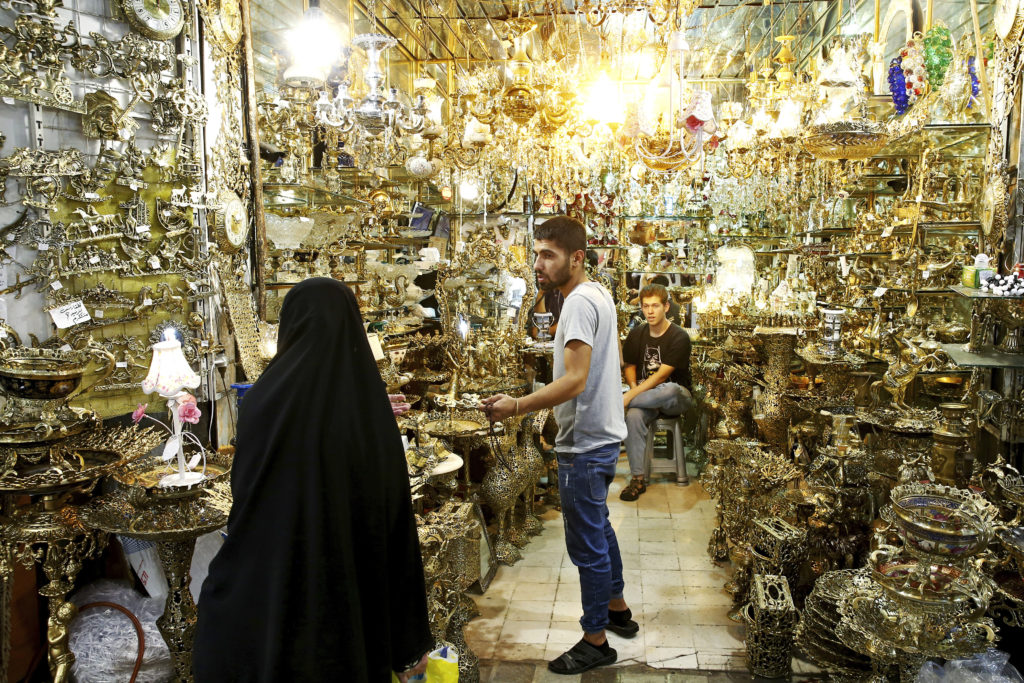
President Donald Trump‘s explosive twitter threat to Iran’s leader comes as his administration is ratcheting up a pressure campaign on the Islamic republic that many suspect is aimed at regime change. No one is predicting imminent war. But Trump’s bellicose, all-caps challenge addressed to President Hassan Rouhani followed a speech by Secretary of State Mike Pompeo in which he accused Iran’s leadership of massive corruption and widespread rights abuses and urged Iranians to rise up in protest. Both the tweet and the speech landed less than two weeks before the administration will begin re-imposing sanctions on Iran that had been lifted under the 2015 nuclear deal. In the meantime, the U.S. is stepping up Farsi-language outreach that is intended to support Iranians demonstrating against the policies of their government. Trump’s tweet doesn’t appear to have been prompted by any notable shift in rhetoric from Iran. It could have been an impulsive reaction to reports from Tehran quoting Rouhani as giving the U.S. an oft-repeated reminder that conflict with Iran would be “the mother of all wars.” Yet animosity directed at the Iranian leadership is an established part of the administration’s broader foreign policy. Iran has dismissed Trump’s late Sunday message — “NEVER EVER THREATEN THE UNITED STATES AGAIN OR YOU WILL SUFFER CONSEQUENCES THE LIKE OF WHICH FEW THROUGHOUT HISTORY HAVE EVER SUFFERED BEFORE” — as a “passive reaction” to Rouhani. But, Tehran was already aware of what was coming from the administration as consequences of Trump’s May withdrawal from the 2015 nuclear accord take shape. As Pompeo noted in his speech to Iranian-Americans and others in California late Sunday, the centerpiece of those consequences will be the re-imposition of U.S. economic sanctions; the first batch will go back into force on Aug. 4 targeting the Iranian automotive sector and trade in gold and other metals. A more significant set of sanctions that will hit Iran’s oil industry and central bank by punishing countries and companies that do business with them will resume on Nov. 4. “Right now, the United States is undertaking a diplomatic and financial pressure campaign to cut off the funds that the regime uses to enrich itself and support death and destruction,” Pompeo said in his speech at the Ronald Reagan Presidential Library and Museum in Simi Valley. “We have an obligation to put maximum pressure on the regime’s ability to generate and move money, and we will do so. Pompeo also slammed Iran’s political, judicial and military officials, accusing several by name of participating in rampant corruption, and called its religious leaders “hypocritical holy men” who amassed wealth while allowing their people to suffer. He said the government has “heartlessly repressed its own people’s human rights, dignity and fundamental freedoms,” and he hailed the “proud Iranian people (for) not staying silent about their government’s many abuses.” “The United States under President Trump will not stay silent either,” he said. He was right. True to form, Trump did not stay silent. But the White House blamed Rouhani for inciting the war of words with his comment that “America must understand well that peace with Iran is the mother of all peace and war with Iran is the mother of all wars.” “WE ARE NO LONGER A COUNTRY THAT WILL STAND FOR YOUR DEMENTED WORDS OF VIOLENCE & DEATH. BE CAUTIOUS!,” Trump wrote. Reaction from Congress, particularly Democrats, was swift and critical. Democratic Sen. Jeanne Shaheen of New Hampshire, a member of the Foreign Relations Committee, acknowledged that Iran’s terrorist activities in the Middle East pose a threat but suggested it wouldn’t be solved through a tweet from Trump. “Sadly, after pulling us out of the nuclear deal with Europe and Iran, there doesn’t seem to be strategy for how to move forward to fight Iran’s activities,” she said. And Virginia Sen. Tim Kaine, the former Democratic vice presidential candidate, called the Twitter blast from the White House “another warning sign that Trump is blundering toward war with Iran.” Trump’s National Security Council pushed back: “Our differences are with the Iranian regime’s actions and, in particular, with the actions of the Islamic Revolutionary Guard Corps, not the Iranian people. The Trump administration’s Iran policy seeks to address the totality of these threats and malign activities and to bring about a change in the Iranian regime’s behavior.” “If anybody’s inciting anything, look no further than to Iran,” said White House press secretary Sarah Sanders said. She added that Trump has been “very clear about what he’s not going to allow to take place.” Trump has a history of firing off heated tweets that seem to quickly escalate long-standing disputes with leaders of nations at odds with the U.S. In the case of North Korea, the verbal war cooled quickly and gradually led to the high-profile summit and denuclearization talks. Still there has been little tangible progress in a global push to rid North Korea of its nuclear weapons program since the historic Trump-Kim Jong Un summit on June 12. Republished with permission from the Associated Press.
Mike Pompeo presses Europe to get tough on Iran
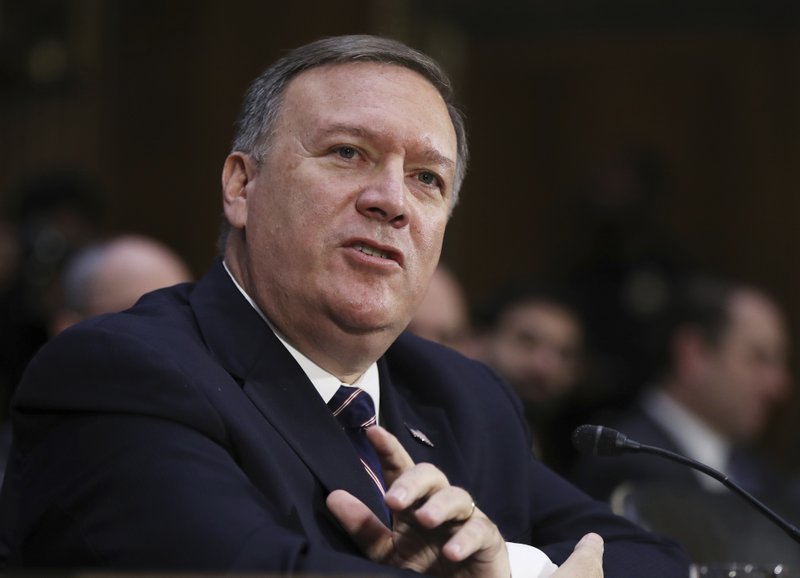
U.S. Secretary of State Mike Pompeo on Thursday pressed European nations to get tough on Iran by cutting off all funding the country may use to foment instability in the Middle East and beyond. Pompeo was meeting with European officials in Brussels following a summit of NATO leaders to make the case for clamping down on Iranian “terrorism and proxy wars.” He urged them to join a U.S.-led economic pressure campaign against Tehran that began in earnest after President Donald Trump withdrew from the landmark Iran nuclear deal in May. “We ask our allies and partners to join our economic pressure campaign against Iran’s regime,” Pompeo said in a tweet ahead of his talks. “We must cut off all funding the regime uses to fund terrorism and proxy wars. There’s no telling when Iran may try to foment terrorism, violence & instability in one of our countries next.” The tweet was accompanied by a map accusing Iran of sponsoring at least 11 terrorist attacks in Europe since 1978. In another post, he said “Iran continues to send weapons across the Middle East, in blatant violation of UN Security Council resolutions. Iran’s regime wants to start trouble wherever it can. It’s our responsibility to stop it.” His comments came as other U.S. officials have fanned out around the globe to warn foreign governments to stop buying oil from Iran or face sanctions and after he accused Iran of using its embassies to plot terrorist attacks in Europe. “Just this past week there were Iranians arrested in Europe who were preparing to conduct a terror plot in Paris, France. We have seen this malign behavior in Europe,” Pompeo said in an interview on Tuesday with Sky News Arabia in Abu Dhabi. He was referring to the arrest of an Iranian diplomat posted to Vienna who was allegedly involved in the plot to bomb an Iranian opposition group rally in France on June 30. The envoy’s arrest in Germany came after a couple with Iranian roots was stopped in Belgium and authorities reported finding powerful explosives in their car. Iran denies involvement and contends the allegations against its diplomat are intended to damage its relations with the European Union. The diplomat, Assadollah Assadi, was charged in Germany on Wednesday with activity as a foreign agent and conspiracy to commit murder. He is suspected of contracting a couple in Belgium to attack an annual meeting of an exiled Iranian opposition group in Villepinte, near Paris, German prosecutors said. He allegedly gave the Antwerp-based couple a device containing 500 grams of the explosive TATP during a meeting in Luxembourg in late June, prosecutors said in a written statement. Belgian authorities also accuse Assadi of being part of the alleged plot reportedly aimed at setting off explosives at a huge annual rally of the Mujahedeen-e-Khalq group, or MEK, in neighboring France, and want him extradited. The MEK is an exiled Iranian opposition group based near Paris with some members in Albania. The formerly armed group was removed from European Union and U.S. terrorism lists several years ago after denouncing violence and getting western politicians to lobby on its behalf. Republished with the permission of the Associated Press.
New study reveals Alabama has 5th highest incarceration rate in the world

The Prison Policy Initiative released a new report in May comparing the incarceration rate of each American state to countries around the world, and the Yellowhammer state came in fifth place overall. Fifth place, compared to the entire world; yikes Alabama. Oklahoma topped the list with 1,079 inmates per 100,000 of populous in their state but Alabama was not far behind, reporting 946 people imprisoned per 100,000 people in the state; the U.S. national average is 698 per 100,000. But the Yellowhammer state was not the only one with higher ratings, a total 23 states in the nation were reported to have rates over the national average, giving them the highest incarceration rates in the world. The report then compared these numbers to other nations around the world, where even places like Slovakia, Argentina, Australia and the Ukraine had less than 200 people per 100,000 incarcerated. “If we imagine every state as an independent nation…every state appears extreme,” said the report. “Massachusetts, the state with the lowest incarceration rate in the nation, would rank 9th in the world, just below Brazil and followed closely by countries like Belarus, Turkey, Iran, and South Africa.” “States like Alabama, with incarceration rates even higher than the U.S. average, compare even worse. Next to other stable democracies, Alabama is off the charts,” the Prison Policy Initiative explained. The prison system in Alabama is long overdue for an overhaul, the state prison system houses nearly twice the inmates it was designed for. Prison officers and inmates have been killed and injured in a series of violent crimes behind bars, and with several reports this year of Sheriff’s stealing and pocketing hundreds of thousands of dollars meant for inmates food rations, it’s a wonder we’re not talking about this issue. In 2014, the Southern Poverty Law Center (SPLC) and the Alabama Disabilities Advocacy Program filed a lawsuit against the Alabama Department of Corrections (ADOC) to end the poor conditions in the state prison system, including the understaffing of both correctional and mental health workers. According to the SPLC, as of January 2018, the state still hadn’t come up with an acceptable remedy to address the “horrendously inadequate” and unconstitutional mental health care and staffing needs of the ADOC. “As Gov. Kay Ivey and ADOC Commissioner Jeff Dunn have both recognized, the constitutional violations of how the state treats prisoners developed over a generation. It will be difficult, and likely costly, to fix them. But ADOC has to fix them,” said Maria Morris, senior supervising attorney for the SPLC, and lead litigator in the case. Ivey responded by adding an additional $51 million to the ADOC budget earlier in 2018.
Mike Pompeo: US will fight Russian interference in 2018 elections

Secretary of State Mike Pompeo said Wednesday the Trump administration will not tolerate Russian interference in the 2018 congressional midterm elections. Pompeo told the House Foreign Affairs Committee that the administration will take “appropriate countermeasures” to fight what he called “continued efforts” by Russia to meddle in November’s vote. He did not elaborate on the Russian interference or say what the countermeasures would be but said there was much more work to be done to stop Russia’s efforts. He said the U.S. had not yet been able to establish “effective deterrence” to halt them. The top-ranking Democrat on the committee, Eliot Engel, however, contended that the Trump administration “is giving Russia a pass” because Russian President Vladimir Putin “supported President Trump over Hillary Clinton” in the 2016 presidential election. “If we allow foreign interference in our elections so long as it supports our political objectives, then we’ve put party before country and put our democracy in crisis,” Engel said. Russian meddling in the presidential election remains a touchy topic for President Donald Trump, as the White House tries to combat the threat posed by special counsel Robert Mueller’s investigation into potential ties between Russia and the Trump campaign. Trump denies there was any collusion. Pompeo was making his first congressional appearance since becoming top diplomat nearly a month ago, after Trump fired his predecessor, Rex Tillerson. Pompeo was testifying on the State Department’s budget, operations and policy priorities, but was asked about a wide range of issues, ranging from diplomacy with North Korea, the pullout from the Iran nuclear deal, and Russia. “We will not tolerate Russian interference in the 2018 elections,” he told lawmakers. “We will take appropriate countermeasures to continued Russian efforts.” He defended the Trump administration’s “enormous efforts to push back against Russia,” which he claimed were “light-years better than what was done in the previous administration.” Republished with the permission of the Associated Press.
US issues steep list of demands for nuclear treaty with Iran
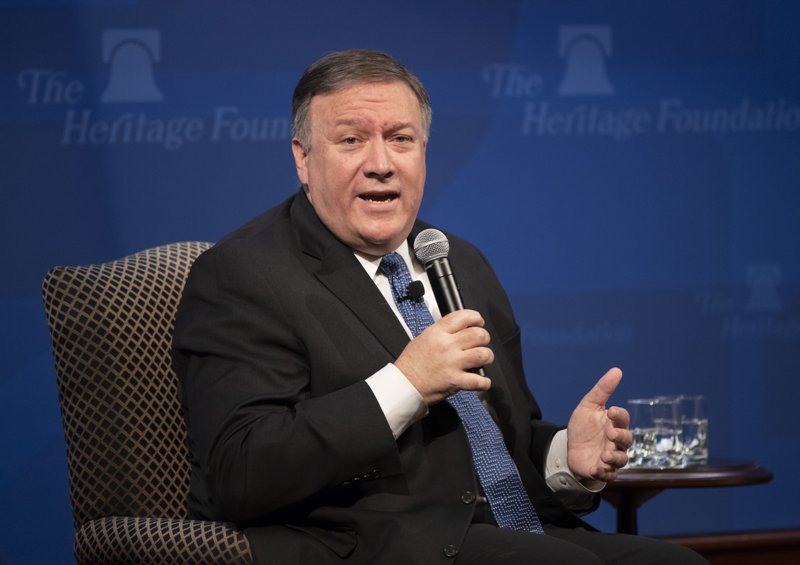
The United States on Monday issued a steep list of demands to be included in a nuclear treaty with Iran to replace the deal scuttled by President Donald Trump and threatened “the strongest sanctions in history” if Iran doesn’t change course. Drawing sharp contrasts with the 2015 deal, Secretary of State Mike Pompeo said a stronger pact should require that Iran stop enrichment of uranium, which was allowed within strict limitations under the previous deal. Iran would also have to walk away from core pillars of its foreign policy, including its involvement in Syria, Yemen, Lebanon and Afghanistan. “This list may seem long to some, but it is simply a reflection of the massive scope of Iranian malign behavior,” Pompeo said. “America did not create this need for changed behavior. Iran did.” Pompeo vowed that Trump’s approach would ensure “Iran has no possible path to a nuclear weapon, ever.” As he called for a better agreement to constrain Iran’s activities, he said the U.S. would “apply unprecedented financial pressure” to bring Tehran back to the table. “These will end up being the strongest sanctions in history by the time we are complete,” Pompeo said at the conservative Heritage Foundation in his first major policy speech since taking over as top diplomat. At the same time, Pompeo offered Iran a series of dramatic potential U.S. concessions if it agrees to make “major changes.” Under a new agreement, the U.S. would be willing to lift all sanctions, restore full diplomatic and commercial ties with Iran, and even support the modernization of its economy, Pompeo said. “It is America’s hope that our labors toward peace and security will bear fruit for the long-suffering people of Iran,” Pompeo said. Still, Pompeo’s list of 12 requirements included many that Iran is highly unlikely to consider. He said Iran must allow nuclear “unqualified access to all sites throughout the country,” Pompeo said, alluding to military sites that were off-limits under the 2015 deal except under specific circumstances. To that end, he also said Iran must declare all previous efforts to build a nuclear weapon, reopening an issue that the U.N.’s International Atomic Energy Agency has already deemed a closed matter. Pompeo also demanded that Iran cease from a range of activities throughout the Middle East that have long drawn the ire of the U.S. and its allies. He said Iran must end support for Shiite Houthi rebels in Yemen, “withdraw all forces” from Syria, halt support for its ally Hezbollah and stop threatening Israel. Iran must also “release all U.S. citizens” missing in Iran or being held on “spurious charges,” he said. Taken together, the demands would constitute a wholesale transformation by Iran’s government, and they hardened the perception that what Trump’s administration really seeks is a change in the Iranian regime. A longtime Iran hawk, Pompeo has spoken positively about regime change in the past, but in his confirmation hearing last month he sought to soften that stance. Laying out Trump’s new approach Monday, Pompeo said he couldn’t put a timeline on how long the strategy might take. “At the end of the day, the Iranian people will get to make their choice about their leadership,” Pompeo said. “If they make the decision quickly, that would be wonderful. If they choose not to do so, we will stay hard at this until we achieve the outcomes that I set forward today.” In another departure from the Obama administration’s approach, Pompeo said that “a treaty is our preferred way to go.” Former President Barack Obama did not seek a Senate-ratified treaty with Iran because of the dim prospects for getting approval from a Republican-run Congress. Pompeo’s speech came after Trump earlier this month infuriated U.S. allies in Europe by withdrawing from the 2015 deal brokered by President Barack Obama, Iran and world powers. Europeans allies had pleaded with Trump not to scuttle that deal and are now scrambling to keep the deal alive even without the U.S. But the Trump administration has held out hope that those same allies will put aside that frustration and work with the U.S. to ramp pressure back up on Iran through sanctions in a bid to bring Tehran back to the negotiating table for a stronger deal. Pompeo said he understood that Trump’s decision “will pose financial and economic difficulties for a number of our friends.” But he warned them that the U.S. planned to follow through with threats to punish European companies that continue doing business with Iran that is allowed under the deal but will violate reimposed U.S. sanctions. “I know our allies in Europe may try to keep the old nuclear deal going with Tehran. That is their decision to make,” Pompeo said. “They know where we stand.” Republished with permission from the Associated Press.
Martha Roby: Strengthening our hand with Iran
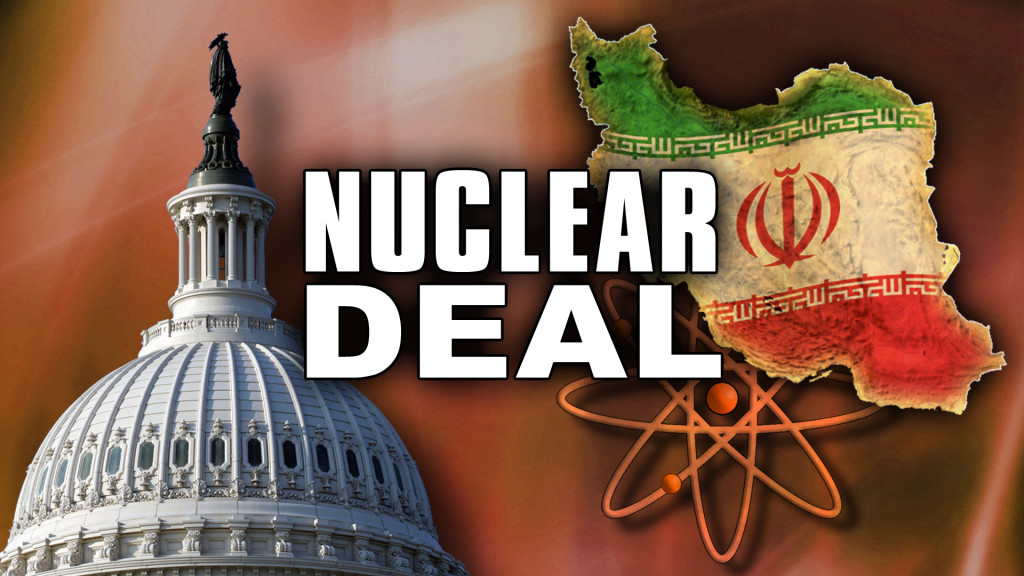
President Donald Trump recently announced he will withdraw the United States from the Iran Nuclear Agreement. From the very beginning, I said this was a flawed, weak deal that serves the interests of bad actors in Iran at the expense of our own. I support the Trump Administration’s efforts to ensure that we truly end Iran’s nuclear weapons program. After all, wasn’t that the point of this agreement in the first place? Under the deal, the Iranian regime was to dismantle their nuclear weapons program in exchange for the lifting of economic sanctions. Needless to say, this didn’t work out, and that’s largely because the Obama Administration failed to uphold the basic tenets they laid out for this agreement from the start. For example, when the previous Administration was negotiating this agreement more than three years ago, they originally said the United States would perform inspections on suspected Iranian nuclear facilities that could occur anywhere, at any time, to ensure that this rogue regime wouldn’t be able to quietly continue their efforts to develop a nuclear weapon. In reality, the Iranians ended up having up to 24 days’ notice in many cases before inspections were allowed to occur. Even then, Americans were prohibited from unilaterally performing them. This is just one example of the many ways the Iran deal fell far short of accomplishing what the Obama Administration promised Congress and the American people. Iran is the leading state sponsor of terrorism, and that hasn’t changed over the last three years. While actively supporting terrorist groups like Hezbollah and Hamas, the nation has been part of horrific terrorism in Yemen, Syria, and Lebanon. The regime has also been developing long-range ballistic missiles. Their ballistic missiles program threatens Israel, our allies in the region, and even U.S. forces. It is no secret that Iran has not stopped its mission to obtain a nuclear weapon, and Israeli intelligence actually proved Iran deceived negotiators from the outset by covering up their nuclear weapons program prior to signing the agreement in 2015. So now, the regime has the best of both worlds: relief from economic sanctions and the freedom to continue their nuclear weapons program without consequence. For starters, I believe it is imperative that we reinstate the economic sanctions against Iran that were in place prior to the Obama-era nuclear agreement. In the House, I have supported policies like this that strengthen our hand towards Iran, including the Iran Sanctions Extension Act, which Congress passed in 2016 to reauthorize for ten years the economic penalties used by the United States to deter Iran from furthering developing ballistic missiles and supporting terrorism. Clearly, there is great room for improvement in our dealings with this rogue nation. As I have said many times before, the Obama Administration’s behavior towards Iran was truly baffling, and I am glad that we have now reversed course. I am hopeful that the Trump Administration can strengthen our hand with Iran after eight years of it being severely weakened. At the end of the day, the bottom line is that Iran’s nuclear weapons program, support for terrorist organizations, and development of ballistic missiles pose a direct threat to the United States and our allies. We must take this very seriously throughout future negotiations with this regime. To do otherwise compromises our own national security. ••• Martha Roby represents Alabama’s Second Congressional District. She lives in Montgomery, Alabama, with her husband Riley and their two children.
Trump withdraws from Iran nuclear deal, Alabama delegation reacts

President Donald Trump on Tuesday declared the United States was pulling out of the Iran nuclear deal and will re-impose sanctions on Iran, saying the deal failed to protect America’s national security interests. “The so-called Iran deal was supposed to protect the United States and our allies from the lunacy of an Iranian nuclear bomb, a weapon that will only endanger the survival of the Iranian regime,” Trump said during a speech at the White House announcing his decision. “In fact, the deal allowed Iran to continue enriching uranium and over time reach the brink of a nuclear breakout.” The re-imposed sanctions will target critical sectors of Iran’s economy, such as its energy, petrochemical, and financial sectors. “This was a horrible one-sided deal that should have never, ever been made. It didn’t bring calm, it didn’t bring peace, and it never will,” Trump continued “It is clear to me that we cannot prevent an Iranian nuclear bomb under the decaying and rotten structure of the current agreement. The Iran deal is defective at its core. If we do nothing we know exactly what will happen.” According to a congressional aide, there will be 90- and 180-day wind-downs on various aspects of the deal, made by former President Barack Obama in 2015. Here are reactions from the Alabama delegation (in order they were received): 7th District U.S. Rep. Terri Sewell: After months of deliberation and extensive conversations with nuclear experts, military officials, and constituent groups, I decided to support the Iran Deal because I believed it was our best option for ensuring a nuclear-free Iran. The Iran Deal was not perfect, but its collective enforcement by the international community made it the best path forward. President Trump’s reckless withdrawal from the Iran Deal has the potential to destabilize an already unstable region. As we lay the groundwork for a diplomatic breakthrough with North Korea, reneging on the Iran Deal could also endanger our chances at establishing another major international agreement. Unilaterally walking away from this agreement leaves America isolated and puts our national security at risk. 4th District U.S. Rep. Robert Aderholt: President Trump has taken this issue very seriously. With all the information he has at his disposal, I trust that he has made the right decision to pull back from what was a bad deal adopted under the Obama Administration. There are several things that remain puzzling about the agreement. For example, many of us are still waiting to see what benefits the Obama Administration hoped to see when they delivered pallets of cash in the dead of night to Iran, a known state sponsor of terrorism. 1st District U.S. Rep. Bradley Byrne: President Obama’s decision to enter into the nuclear ‘deal’ with Iran was the biggest U.S. foreign policy mistake since the end of World War I, and it has not made America or the world a safer place. President Trump is right to exit the deal and hold Iran accountable for their reckless and dangerous actions. It is also important to remember that there has been bipartisan opposition in Congress to the Iran deal since it was first announced. Despite a majority in the House and the Senate expressing opposition to the deal, President Obama chose to act alone without Congressional approval, and that is one of many reasons why this ‘deal’ was never going to work. Moving forward, I pledge to do what I can to work with the Trump Administration to hold Iran accountable, push back against their nuclear weapon and missile programs, and ensure the safety of the American people and our allies. 2nd District U.S. Rep. Martha Roby: I have said from the very beginning that the Iran Deal was a flawed, weak deal that served the interests of bad actors in Iran at the expense of our own. I strongly opposed this Obama-era executive agreement, and I support the Trump Administration’s efforts to ensure that we truly end Iran’s nuclear weapons program. Moving forward, Congress must stand locked-arm in our approach to dealing with this rogue nation for the sake of our national security. I believe it is imperative that we reinstate the economic sanctions against Iran that were in place prior to this nuclear agreement. It’s no secret that Iran has not stopped its efforts to obtain a nuclear weapon, and we must take this threat very seriously in our future negotiations with the leading state sponsor of terrorism. This article will be updated as additional reactions come in.


